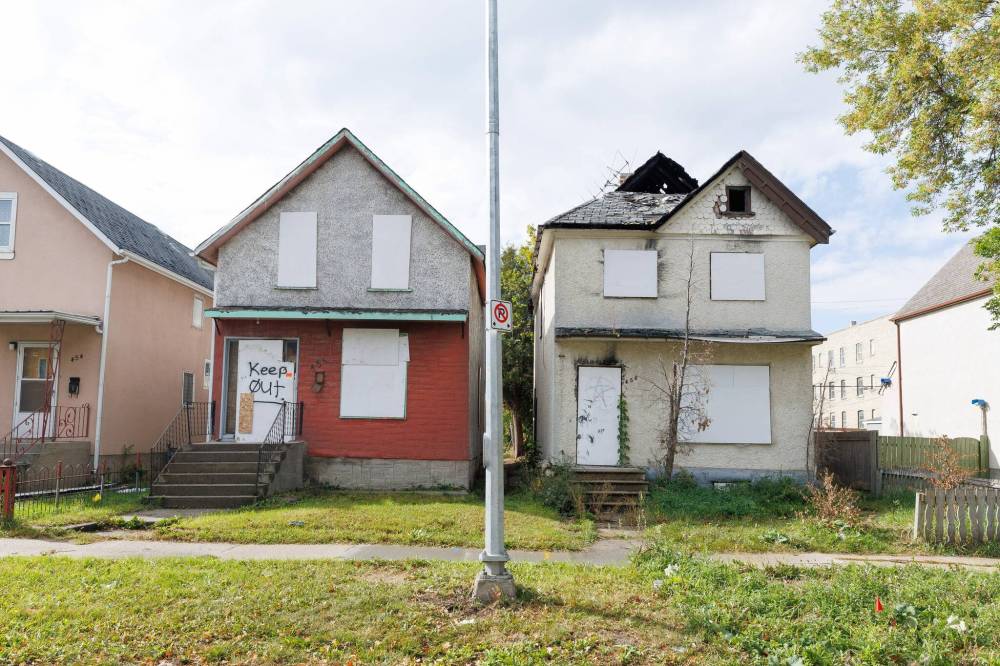It’s great the City of Winnipeg is taking several owners of derelict buildings to court over unpaid fees.
But it doesn’t go far enough. The city should be taking steps to seize those properties and sell them to someone, or some agency, willing to make them habitable again.
Court records reviewed by the Free Press show the city has filed at least four lawsuits this year against the owners of vacant buildings for unpaid fees. The latest civil claim was made against Karin Gordon, who owes $16,247 in fees, plus court costs, to the city for a vacant house on Egerton Road in the Glenwood neighbourhood. The court filing says bylaw officers have inspected Gordon’s property multiple times between 2017 and 2024.

Even though the city has brought in more stringent rules in recent years for derelict properties, the number of empty, boarded-up buildings continues to grow.
The house is a wreck, filled with combustible material, garbage, mice feces and black mould, and is marred by broken windows and unsecured doors. There is damage inside and outside the building, court records show. It’s unsafe, it’s a blight on the neighbourhood and it reduces the value of surrounding real estate.
Gordon is in violation of the city’s vacant building bylaw, which requires owners of empty buildings to maintain them to certain standards. Under the bylaw, empty buildings must be secured with boards of a certain thickness and the property must be in good repair. If it isn’t, if there are holes in walls or the roof is falling apart, the owner is not in compliance.
When charged and convicted under the bylaw, the city can then begin the legal process of seizing the property without paying the owner for it.
It’s called “take title without compensation.” It’s a lengthy legal process that can only begin when abandoned building owners are convicted under the bylaw.
Unfortunately, the city hasn’t used the process since 2016. Between 2010 and 2016, 16 properties were seized using that legal mechanism. Then the seizures stopped. City officials claim that changes to provincial legislation in 2017 made it more difficult to get convictions under the bylaw and, therefore, more challenging to initiate the process of seizing abandoned buildings.
That may be true to a certain extent. But the city also lost the political will to use that legal tool.
Even if it is more difficult to get convictions under the bylaw (something the Kinew government should be looking at, if true), it’s not impossible. The city should still be able to go after the worst offenders.
Suing them in court for unpaid fees is fine. But they need to be convicted under the bylaw so the city can start the process of confiscating those properties.
Mayor Scott Gillingham suggested last month the city is considering using that legal tool again. Coun. Sherri Rollins, who chairs the city’s property and development committee, said last month it’s time to crack down on those who allow their properties to sit vacant and boarded up for long periods of time. She said tougher policies are on the way to combat the problem, calling it a “wake-up call” to derelict building owners.
The city has brought in more stringent rules in recent years for derelict properties, including new and higher empty building fees, boarded-up building fees and a new policy to recoup firefighting costs. Despite that, the number of empty, boarded-up buildings continues to grow.
For some, the only solution is to seize the property. Building owners have a right to own private property. But they also have a responsibility to maintain them and ensure they are habitable. If they can’t — or refuse — to do so over an extended period of time, they should lose the right to own that property.
Resurrecting the process of taking title without compensation will take political will at city hall. It’s time to start having that conversation in an open and transparent way. Councillors should be asking administration why the process hasn’t been used in eight years and what steps it’s taking to bring it back. If there are legitimate legislative changes required at the provincial level to expedite the process, those conversations should also be taking place.
It may be the province needs to make changes to the Provincial Offences Act and the Municipal By-law Enforcement Act to streamline the bylaw prosecution process. That could be done relatively quickly during the fall sitting of the legislature. It would require co-operation between the city and the province.
At the end of the day, the political will from city hall and the province has to be there to get the job done. It has to be a priority. So far, it hasn’t been.
tom.brodbeck@freepress.mb.ca

Tom Brodbeck
Columnist
Tom Brodbeck is a columnist with the Free Press and has over 30 years experience in print media. He joined the Free Press in 2019. Born and raised in Montreal, Tom graduated from the University of Manitoba in 1993 with a Bachelor of Arts degree in economics and commerce. Read more about Tom.
Tom provides commentary and analysis on political and related issues at the municipal, provincial and federal level. His columns are built on research and coverage of local events. The Free Press’s editing team reviews Tom’s columns before they are posted online or published in print – part of the Free Press’s tradition, since 1872, of producing reliable independent journalism. Read more about Free Press’s history and mandate, and learn how our newsroom operates.
Our newsroom depends on a growing audience of readers to power our journalism. If you are not a paid reader, please consider becoming a subscriber.
Our newsroom depends on its audience of readers to power our journalism. Thank you for your support.